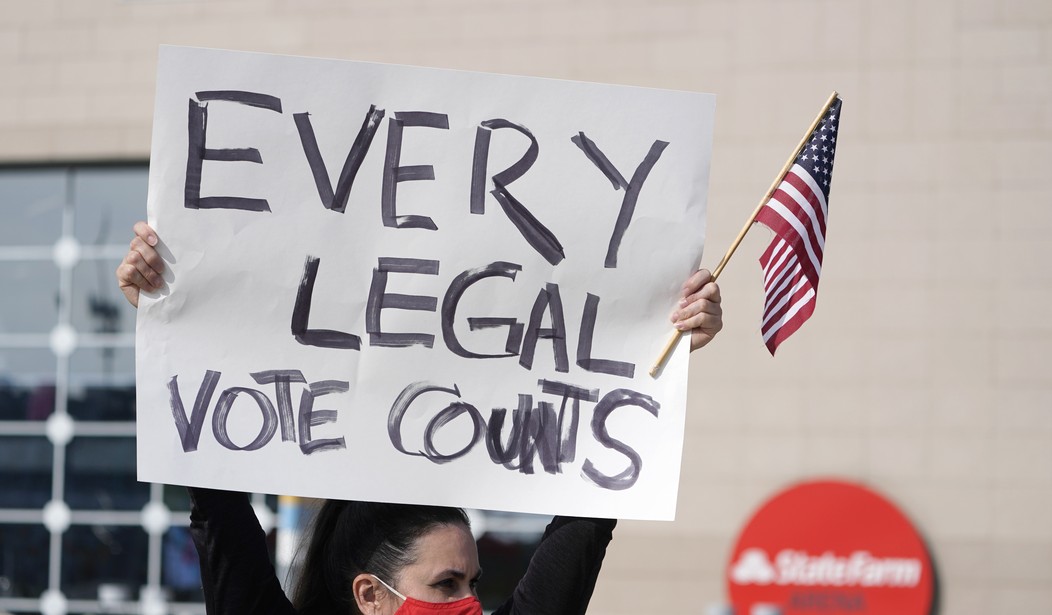“All politics is local” is a famous aphorism that many forget amid the overbearing national media. But the numerous recent censures by local GOP organizations of arrogant politicians illustrate the untapped power of grassroots activism.
Our unique federalism was designed for most power to be held by the states and the people. While Congress wastes its time and our money by infringing on Trump supporters’ First Amendment rights, state legislators can step up and save our country.
In most conservative states, the legislatures meet only in the first half of the year, and the Texas legislature is in session only once every two years. So the window of opportunity is now.
Establishing election integrity should be the top priority in every state legislature, after the fiasco of the recent presidential election. Polls continue to show that most Republicans think the election was unfairly conducted for a number of unprecedented reasons, and that Joe Biden did not legitimately win.
A presidential election that half the voters regard as illegitimate cannot be salvaged by barbed wire which today blights the history, grandeur, and beauty of Washington, D.C. An American presidency needs to be based on election integrity, not thousands of troops stationed at our Capitol.
Fortunately, the U.S. Constitution grants state legislatures the full authority to govern elections for the presidential electors who ultimately choose the president. Courts, which are dominated by liberals at the state level and in most federal venues, have no role in that process.
Recommended
Control of the U.S. Senate is at stake in next year’s elections, as its current 50-50 split hangs in the balance. Already three Republican senators – in Alabama, Ohio, and Pennsylvania – have announced they are not running for reelection, and many other states are up for grabs in elections that will depend on the voting procedures used.
Since 2016, polls have shown that there are few undecided voters in our country, and thus election outcomes depend more on the voting process than on political messaging. Consultants make big bucks for themselves by taking commissions for placing political ads on TV, even though such ads have no effect on voters who have already made up their minds.
The gold standard for election integrity is in-person voting, as used nearly exclusively (and successfully) for more than 200 years in our great country. This ensures a secret ballot, the absence of ballot harvesting (in which political partisans collect unverified ballots from union shops and nursing homes without supervision), and robust poll monitoring so that both parties can verify who is allowed to cast a ballot.
Justice Clarence Thomas, in a persuasive opinion on Monday, expressed dismay at the Supreme Court’s refusal to hear a challenge to the improper counting of untimely mail-in ballots in Pennsylvania. He cited liberal sources to explain how mail-in voting is inherently vulnerable to fraud.
Quoting the New York Times, Justice Thomas observed that “the risk of fraud is ‘vastly more prevalent’ for mail-in ballots.” Quoting as his authority the current Dean Heather Gerken of his progressive alma mater, the Yale Law School, Justice Thomas further explained that virtually “all the evidence of stolen elections involves absentee ballots and the like.”
Justice Thomas pointed out that way back in 2012, the New York Times’ Supreme Court reporter declared that “voting by mail is now common enough and problematic enough that election experts say there have been multiple elections in which no one can say with confidence which candidate was the deserved winner.” These prophetic words from that reliably liberal source rang true in 2020.
To close this open invitation to fraud, Florida Governor Ron DeSantis has called for his legislature to limit mail-in voting. Florida will likely gain two more presidential electors due to the recent census, and will be even more important in the next presidential election than the last.
President Trump had to spend precious time campaigning in Florida in the crucial final weeks of the last election. If Florida adopts election integrity, then Trump could safely count on carrying that state next time, to free up time to campaign in other battleground states.
Texas Governor Greg Abbott has reportedly made election integrity a priority for the biennial legislative session there, and curtailing fraudulent mail-in voting is high on his agenda. Stuffing the ballot box with mail-in votes has caused the Republican margins there to dwindle, as each election cycle Democrats become more adept at milking votes from election shenanigans.
States should enact legislation specifically basing the selection of presidential electors on in-person voting, except for military personnel on active duty and narrowly justified absentee voting, as Idaho House bill H0105 would do. Nothing requires that the voting process used to select presidential electors be the same as the process for electing a town’s dog catcher.

























Join the conversation as a VIP Member